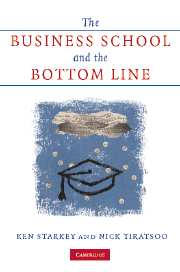Book contents
- Frontmatter
- Contents
- List of tables
- Acknowledgements
- Prologue
- 1 Introduction
- 2 The development and diffusion of the business school
- 3 Business schools in the era of hyper-competition: ‘more “business” and less “school”’
- 4 Business school education
- 5 Business school research
- 6 Experiments and innovations
- 7 Imaginary MBAs
- 8 Business school futures: mission impossible?
- Epilogue
- Index
5 - Business school research
Published online by Cambridge University Press: 02 December 2009
- Frontmatter
- Contents
- List of tables
- Acknowledgements
- Prologue
- 1 Introduction
- 2 The development and diffusion of the business school
- 3 Business schools in the era of hyper-competition: ‘more “business” and less “school”’
- 4 Business school education
- 5 Business school research
- 6 Experiments and innovations
- 7 Imaginary MBAs
- 8 Business school futures: mission impossible?
- Epilogue
- Index
Summary
A quick tour of business school websites today encourages the belief that schools are primarily focused on teaching. There is copious material on courses, virtual tours round state-of-the-art teaching and learning facilities, and panegyrics about the alleged benefits of this or that qualification. By contrast, an informal conversation with business school faculty often produces rather different impressions. For many, teaching seems to be a bit of a chore. There are grumbles about increasing class sizes or changing student expectations. If the subject of research is mentioned, however, the response will in all probability become animated. Sometimes this is fuelled by an enthusiasm for the subject at hand. More often than not it is because faculty recognise that what they produce in terms of reports, articles and books now largely determines their academic, and perhaps personal, fates – for example, whether or not they will gain promotion or be able to engineer a lucrative move to a better institution. The basic fact is that, regardless of the public facade, it is research and not teaching that has become the real fulcrum of much business school life. In this chapter we begin by examining how such a situation has come about, and then discuss its overall significance, focusing on two issues that are currently causing particular controversy: the quality of what is produced, and its relevance (in other words, usefulness to potential end users).
THE RISE OF RESEARCH
For most of the twentieth century only a few elite business schools really concentrated to any great degree on research. From the1970s onwards, however, there was accelerating change.
- Type
- Chapter
- Information
- The Business School and the Bottom Line , pp. 115 - 139Publisher: Cambridge University PressPrint publication year: 2007

